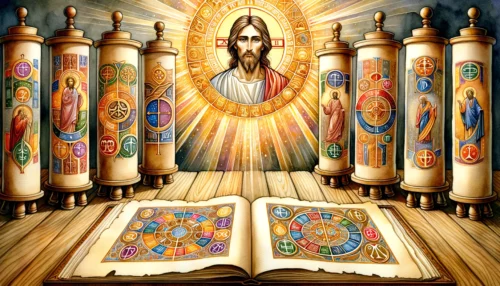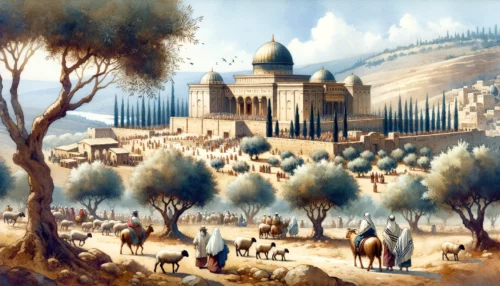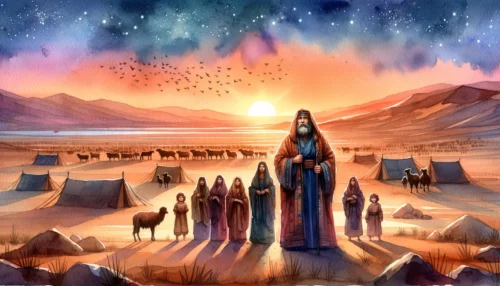Often, the Old Testament can appear distant and less relevant to contemporary believers, especially when contrasted with the New Testament’s more immediate resonance. It’s filled with stories of a time far removed from ours, laws that seem perplexing, and prophecies that are complex to decipher. However, to disregard the Old Testament is to overlook the foundational bedrock of Christian faith. This article explores the intrinsic value of studying the Old Testament, explaining its enduring relevance and how it enriches our understanding of God, faith, and the Christian journey.
Unraveling the Nature of God through the Old Testament
It’s fair to say that the Old Testament offers us a panoramic view of God’s character, providing a comprehensive understanding that helps us connect with Him on a deeper level. Let’s delve into this.
One of the most profound revelations of God in the Old Testament is His omnipotence. He is portrayed as the Creator of the universe, the one who spoke and brought everything into existence from nothingness (Genesis 1-2). This display of divine power establishes God as supreme over all creation, a vital understanding for our faith.
The Old Testament also illuminates God’s omniscience, His all-knowing nature. For instance, God’s interaction with Abraham and Sarah concerning the birth of Isaac shows His knowledge of future events (Genesis 18). Similarly, His detailed instructions to Noah about the impending flood demonstrate His foresight (Genesis 6-9). These accounts provide assurance that God knows the end from the beginning, reinforcing our trust in His plans.
Further, God’s omnipresence is evident throughout the Old Testament. From His presence in the burning bush speaking to Moses (Exodus 3) to His presence in the pillar of cloud and fire guiding the Israelites out of Egypt (Exodus 13), we see a God who is everywhere, involved and engaged.
The Old Testament also reveals God’s holiness and righteousness. The laws He gave to Israel, the moral and ceremonial codes (Leviticus, Deuteronomy), were not arbitrary rules but reflected His holy nature. They were meant to set Israel apart as a holy nation, reflecting the character of their holy God.
Moreover, the Old Testament is rich with instances of God’s love, mercy, and patience. Despite Israel’s frequent disobedience, God is shown as a compassionate and forgiving God, slow to anger and rich in steadfast love, persistently calling His people back to Himself (e.g., Book of Hosea).
Lastly, but certainly not least, we see God’s covenant faithfulness. The covenant He made with Abraham, Isaac, and Jacob, promising to make them a great nation, bless them, and through them bless all nations, was faithfully fulfilled despite their shortcomings (Genesis 12, 15, 17). This covenant faithfulness of God is a theme that runs throughout the Old Testament and is foundational to our faith.
Looking closely at the Old Testament, we find it brimming with revelations about the nature of God. It helps us see Him as omnipotent, omniscient, and omnipresent. It reveals His holiness, righteousness, and love. It assures us of His covenant faithfulness. The Old Testament, therefore, is not a collection of ancient, irrelevant texts but a treasure trove unveiling the very nature of God. For modern believers, studying the Old Testament is like embarking on an enriching journey, exploring the depths of God’s character, and understanding Him more fully. This, in turn, strengthens our relationship with Him and gives substance to our faith.
The Old Testament’s Role in Shaping Christian Beliefs
The Old Testament, far from being obsolete or irrelevant, plays a critical role in shaping Christian beliefs, serving as the cornerstone of Christian theology. To fully appreciate this, we need to dig a little deeper.
At the heart of Christian beliefs is the understanding of human sinfulness and the need for redemption. It’s in the Old Testament that we first see the origin of sin and its consequences. When Adam and Eve disobeyed God in the Garden of Eden (Genesis 3), it led to a broken relationship with God, a condition inherited by all humanity. This pivotal event sets the stage for the need for reconciliation and redemption, key themes in Christian theology.
Next, let’s look at the concept of the Messiah. The Old Testament is rife with prophecies concerning a future Anointed One who would come to redeem humanity (Isaiah 53, Micah 5). These prophecies play a crucial role in shaping Christian beliefs about Jesus as the Messiah, the one who fulfills these ancient promises.
Also, the Old Testament is instrumental in shaping our understanding of God’s law and principles for living. The Ten Commandments (Exodus 20), for example, form a moral framework that has profoundly influenced Christian ethics. The wisdom literature, such as Proverbs and Ecclesiastes, provides practical guidance for living a life pleasing to God.
Furthermore, the Old Testament shapes our belief in the community of faith. The formation and journey of Israel, the covenant community, serves as a model for the Church. It offers insights into God’s purpose for His people and how they are to live and worship together (Exodus 19, Leviticus 23).
Lastly, the Old Testament informs our eschatological beliefs – our understanding of the end times. From the promises of a new heaven and a new earth (Isaiah 65) to the resurrection of the dead (Daniel 12), the Old Testament lays the groundwork for Christian beliefs about the ultimate future.
The Old Testament is not just a prelude to the New Testament but an essential part of Christian scripture that shapes our core beliefs. It gives us a deeper understanding of sin and redemption, enriches our belief in Jesus as the Messiah, provides moral guidance, shapes our concept of community, and informs our eschatology. As such, studying the Old Testament is not just about learning history or ancient literature; it’s about deepening our understanding of Christian beliefs and strengthening the foundation of our faith. By immersing ourselves in the Old Testament, we can gain a fuller appreciation of the breadth and depth of God’s redemptive plan and His unchanging character, both of which remain as relevant today as ever before.
Christ in the Old Testament: A Look at Prophecy and Foreshadowing
While the name of Jesus may not appear in the Old Testament, His presence is woven throughout its fabric, with prophecies and foreshadowings pointing towards His coming. Let’s unpack this intriguing aspect of Old Testament study.
The Old Testament is replete with prophecies about the Messiah, the Anointed One who would come to save God’s people. For instance, the prophet Isaiah foretold that the Messiah would be born of a virgin (Isaiah 7), suffer for our sins (Isaiah 53), and establish a kingdom of peace (Isaiah 9). These prophecies, written centuries before Jesus’s birth, are seen by Christians as clear predictions of His life and mission.
Alongside explicit prophecies, the Old Testament is filled with types and foreshadowings of Christ. A type is a person, event, or institution that serves as a real-life illustration of something that would be fulfilled in Christ. For example, the sacrifice of Isaac by his father Abraham (Genesis 22) is often seen as foreshadowing God the Father offering His Son, Jesus, as a sacrifice for humanity’s sin.
Another powerful type of Christ in the Old Testament is the Passover lamb. The Israelites were instructed to sacrifice a lamb without blemish and apply its blood to their doorposts to be spared from death (Exodus 12). This event is seen as a prefiguration of Jesus, the Lamb of God, whose sacrificial death and shed blood bring deliverance from the spiritual death caused by sin.
Moreover, the entire system of Levitical sacrifices, where animals were offered to atone for sins (Leviticus 1-7), foreshadows Christ’s ultimate sacrifice on the cross. Jesus’s death is understood as the once-for-all sacrifice that fulfills and completes the Old Testament sacrificial system.
In the Old Testament, we also see the concept of the kinsman-redeemer, someone who rescues a relative from difficulty or danger (Book of Ruth). This serves as a type of Christ, our kinsman-redeemer, who rescues us from the peril of sin.
Unveiling Christ in the Old Testament through prophecy and foreshadowing deepens our understanding of His mission and enriches our appreciation for God’s intricate plan of redemption. It affirms the consistency of God’s message across both Testaments and reveals the incredible continuity of the Bible. The Old Testament is not an outdated precursor to the New Testament but rather an integral part of God’s revelation that points us to Christ. Studying it helps us see the remarkable ways in which God prepared the world for the coming of Jesus, which in turn strengthens our faith and awe in God’s wisdom and sovereign plan.
A Journey through the Pages of Old Testament
The study of the Old Testament is much like embarking on a voyage that takes us deeper into the heart of God, His plan for humanity, and His redemptive work through Christ. We’ve journeyed through understanding the multifaceted character of God, recognizing how our core Christian beliefs are shaped by these ancient scriptures, and exploring the prophetic voices and foreshadowings that point to the coming of Jesus.
- How does studying the Old Testament affect your perception of God’s character?
- In what ways can the Old Testament narratives and teachings shape your personal beliefs and actions?
- Can you identify any new insights about Jesus from the Old Testament that you hadn’t considered before?
Take heart, for the Old Testament isn’t a closed book meant for a time gone by. It’s a vibrant, living testament of God’s love, grace, and faithfulness. As you explore its depths, may your understanding of God and His plan become richer, your faith stronger, and your love for Him deeper. Through these sacred pages, may you encounter God in fresh and transformative ways, growing in the knowledge of His enduring truth that speaks to all generations.














